#Hugo is just a macguffin
Explore tagged Tumblr posts
Text
Did I just listen to a song from West Side Story after months of forgetting it existed and immediately begin to think of the Freckle and Team Awesome Siblings? Yes. Yes I did.
Did I just spend and hour writing a small fic despite the fact that I have another wip I need to finish plus an inbox full of requests I said I would do? Yes. Yes I did.
Do I regret it? No. Because Freckle Sibs and Eugene angst.
Rapunzel clenched her teeth. For the first time in her life, she was angry at Varian, her little brother. Which she felt guilty for, none of this was his fault, he lost his brother, his closest family member, he was hurting too. She desperately wanted to feel anything else than anger at him. She just wanted to be angry at the boy, the monster that killed her love. But no, Varian, her sweet lovely Varian, was defending him.
“A boy like that, who’d kill your brother, forget that boy and find another.” She began to sing, overcome with grief and rage. She turned to the young ravenette who was standing still, grief plastered over his face. If the Saporians had never tried to take the Coronans turf this never would have happened. Eugene would be alive and she wouldn’t have to wipe her or Varian’s tears. Her scowl hardened. “One of your own kind, stick to your own kind.”
Grief and pain flashed across her little brother's face, and he promptly turned his head as he clenched his fists. She could feel the mix of anger and pain and heartbreak emanating from him. The room was filled with it. But unlike her, he was being stubborn and idiotic.
She forced back a sob, her grief being pushed back by her rage. Varian was being blind to young love. He wasn’t thinking straight. She once prided him on his optimism and big heart, as she shared it with him. But eventually reality had to set in. Why it sat with her and not her baby brother, she wasn’t sure.
Well, she was. He was blinded by young love. Young love with a murderer.
“A boy like that, will give you sorrow. You’ll meet another boy tomorrow. One of your own kind, stick to your own kind.”
She would never force Varian to be with someone he didn’t love, but why couldn’t he have gotten with Faith, or Jane? Not Saporian scum. Clearly, they were all cruel inhumans. Bent on destroying her life. They took away her Eugene, and now they were trying to take away her Varian. They murdered her love and used cunning and trickery to manipulate her second love.
Varian scowled and he turned away, unable to even face his sister in her grief induced rage. He had never seen her like this, he didn’t want to, he couldn’t stand it. And he couldn’t stand that in a way, he was perpetuating it. He had hurt her. By being in love.
He swallowed back a sob. He lost his brother and he was going to lose his sister. Over some boy he met 48 hours ago. But he loved that boy. He was in love.
Rapunzel didn’t understand. Varian loved Eugene and he was heartbroken, utterly heartbroken. He wasn’t sure how to even go on after his death anymore. But, his death was inevitable. This gang war, this cycle, someone was always going to end up dying. Eugene was always going to end up dying by a Saporian’s hand. It just happened to be Hugo who was holding the knife. But he knew Hugo, he knew he didn’t want to kill his adoptive brother. It was all just a horrifying, unfortunate situation. But Rapunzel was too wrapped up in her grief to see it that way.
She, like him, had been against the turf war, the separation, the hatred. But, after years of the fighting, and then seeing her fiancée’s body in the morgue, the hatred had gotten to her too. He couldn’t say he blamed her, but why couldn’t she see Hugo was just another victim too?
“A boy who kills cannot love, a boy who kills has no heart.” Rapunzel sang angrily over Varian’s thoughts. His attempts to, avoid her, in a sense, hadn’t worked. She angrily stomped over to him and grabbed his chin. She was gentle, but the anger in her eyes was more painful than if she had clawed him.
“And he’s the boy who gets your love and get your heart. Very smart, Varian. Very smart.” She spat.
Varian glared at her and ripped his head away from her hand. He rushed through the curtain acting as a door, desperate to get away from her. But she was quick on his heels, her grief and anger lacing her melodic voice and cutting through his heart. He held his hands over his ears, clawed his hair, and grit his teeth.
“A boy like that wants one thing only. And when he’s done he’ll leave you lonely. He’ll murder your love; he murdered mine. Just wait and see, just wait Varian, just wait and see.”
Varian’s grief, and building anger, boiled over. How dare she. No, he understood why she was mad, he sympathized with her. He was mad too, but she didn’t understand. He needed her to just listen. He turned to her, the neon signs from outside the kitchen window providing enough light to see her, contrasting with the eerie shadows of the small, darkened, run down apartment. All of Rapunzel’s paintings, crafts, and thrifted decor did nothing to offset the darkness that was cast in the wake of Eugene’s death. The darkness of the evening seemed much darker now.
“Oh no Rapunzel no. Rapunzel no.” He sang back, trying to be calming and loving. He wasn’t mad at her. He desperately just wanted her to listen, to not let her grief blind her and for her to be her open-hearted self again. “It isn’t true, not for me. It’s true for you, not for me.” He walked up to her, face to face. He felt tears begin to burn in his eyes, Rapunzel’s glare softened very slightly, so he continued.
“I hear your words, and in my head, I know they’re smart.” Because he did. He knew Rapunzel had every right to be angry and to hate Hugo. He knew that he should be angry and hate Hugo. But he didn’t, because he loved him too much to blame him. And he couldn’t stand Rapunzel, his sister, hating him and trying to get Varian to hate him.
Didn’t she always say that hate was the root of the problem here? What caused this war? Didn’t she see she was perpetuating this cycle? That she will end up just like Eugene and Andrew?
He loved Hugo. He wasn’t going to end up like them, like she was becoming.
“But my heart, Rapunzel, but my heart, knows they’re wrong. And my heart is too strong. For I belong to him alone, to him alone. One thing I know, I am his. I don’t care what he is. I don’t care why it’s so. I don’t want to know.” While he sang, trying to get through to her, she stubbornly repeated her earlier words. “A boy like that, who killed your brother, forget that boy and find another. He’ll murder your love and he murdered mine. A boy who kills cannot love. A boy who kills has no heart. And he’s the boy who gets your love and gets your heart. Very smart, Varian, very smart!”
Both of their voices cracked, and their respective dams broke. Rapunzel was giving him the most angry, hateful, pained look. Varian glared at her. Both, through their tears.
Whilst singing, Varian’s nervous restless nature had backed the two of them into the nearly pitch black bedroom Varian had claimed.
“Oh no Rapunzel no, you should know better!” He practically screamed. “You were in love, or so you say!”
Varian panted, sweat and tears mixing down his face. Rapunzel looked about the same. They were standing toe to toe, two broken hearts. Two grieving hearts. Rapunzel was angry and hateful, she was hurting. And he was making it worse.
He never wanted to see the face she was making at his words again. The pain, the hurt, the betrayal. It hurt him.
His glare softened and he took on a gentler tone. He took her hands and sat down onto the worn down mattress. She joined him, the dip brought them side to side, touching.
“You should know better.”
“I have a love, and it’s all that I have. Right or wrong, what else can I do?” “I love him, I’m his. And everything he is, I am too.” He leaned his forehead onto hers as he crooned. She leaned into him with a sob.
Because she could understand Varian. He fell in love easily but he had never fallen as hard as he had with Hugo. The two were practically made for eachother. One look at them and she had begun to plan their wedding. And she knew, down in her heart, past the grief induced anger, that Hugo loved Varian. That Hugo was a good person. He had left the Saporians. Sure he had a rivalry with Eugene, but he wasn’t a murderer. He had just happened to be holding the knife.
She didn’t forgive Hugo, she didn’t think she could yet, if ever. But she couldn’t blame Varian for loving him. And she couldn’t live with herself if she ever convinced him to abandon his love for him. They were made for eachother, they were deeply and madly in love, they were best friends.
They had what she and Eugene had. How could she take that away from Varian? Especially when she knew Eugene could be a bad person, and had hurt her family? Not the same way Hugo had, but she didn’t want to be hypocritical. Eugene had hurt people and he had changed. He had invited his baby cousin to come live with him and doted on the young boy, treating him as a cherished little brother. He used to be a selfish thief, and had remained a gang member. But he was also a doting and loving fiancée, and a loving brother, with big dreams for their family.
They were the only family they had left anymore. She wasn’t going to leave him, she wasn’t going to hurt him.
She couldn’t live with herself, and she didn’t want Eugene to look down from Heaven to see the two most important people in his life separated. To see that she abandoned his baby brother, their baby brother.
Besides, love changed a person. It changed Eugene. There was no way Varian’s love wasn’t going to change Hugo, if it hadn’t already.
She knew that man felt remorse, guilt, for what he had done.
In a way, a very small way, that was enough for her.
She could feel their anger subside as she placed a hand on Varian’s cheek, and cried with him. She listened to him sing through his tears, she knew he knew she was listening to him.
“I have a love, and it’s all that I need. Right or wrong, and he needs me, too. I love him, we’re one. There’s nothing to be done. Not a thing I can do. But hold him, hold him forever. Be with him now, tomorrow, and all my life.”
Rapunzel let the words sit in and resonate with her. She understood. She absolutely understood. She opened her eyes along with Varian. She smiled weakly at him. Her eyes were pained, but loving. Varian reciprocated the look.
Rapunzel loved Eugene despite all the pain he had caused, and Varian loved Hugo despite all the pain he had caused.
And Rapunzel loved Varian. And Varian loved Rapunzel. They were best friends, siblings, family.
Rapunzel pulled her little brother into a hug which he gladly accepted, wrapping his arms around her like she was a lifeline, and burying his head into her shoulder, the shawl she wore still reeking of death from the morgue. She wrapped her arms around him supportively, protectively, lovingly.
The two sang in unison.
“When love comes so strong, there is no right or wrong, the love is your life.”
#Gee I sure hope Hugo doesn’t die!#Actually I’m glad he does because that’s more opportunity for freckle sibs bonding :D#I’m a terrible person sorry Hugo#I love you#I just love the parallel of Rapunzel and Varian being sibs who lost their significant others and having to learn to move on#And building a life together#a little more#Technically this is about Varigo but because I’m me it’s more about the freckle babies#Hugo is just a macguffin#A plot device for sibling bonding and fluff#Don’t worry this au is all just some weird fever dream raps had after taking shrooms#Eugene isn’t dead he’s making beignets with Lance#tts#tangled the series#rapunzel's tangled adventure#varian#rapunzel#eugene fitzherbert#hugo vat7k#hugo rottewange#freckle siblings#varigo#new dream#west side story
16 notes
·
View notes
Note
Hi Mothra, random question:
Can you infodump a bit on anything Skylanders? My partner loves it (Especially Stealth Elf) and I wanna understand the pure brainrot he's got going on with it.
Hatefully yours (/silly),
Jayson Gayson
OKAY SURE. so i will tell you a bit about skylanders. the protag of the skylanders games aren't actually the skylanders. since you can swap to any skylander at any time, you can't really give them this unique role. actually, YOU, the player, are the main character. you are a Portal Master who uses the Portal of Power to bring skylanders back to their home dimension of skylands (putting the toy on the portal) after they were banished to earth and turned into statues (toys.) by the villain. so frequently people in the story will refer to The Portal Master. it doesn't actually play a role in the story that much but ive always found it neat that the sort of meta-element in toys to life is there. there's no Infinityster in Disney Infinity, no Amiibo Lord in amiibo, no Dimension Keeper in Lego Dimensions... but for skylanders, the actual act of putting the toy on the portal is incorporated into the story of the game. i think that's such a cool way to do it.
ANYWAYS. skylands is your typical Fantasy Land brimming with magic. there are other Portal Masters in skylands but theyre mostly gone. as of right now the only ones are you the player, this old guy named Master Eon, and a Dark Portal Master who is the villain of the games named Kaos. basically if invader zim was human. i do mean that literally. the big macguffin centerpiece of the magic in skylands is called the Core of Light so the first game starts with kaos destroying that. and it's up to us the portal master to send skylanders back to skylands temporarily in order to stop this looming threat.
throughout the series you also need people to bounce off and follow in cutscenes, so you do get a trio of deuteragonists as well! flynn, an egotistical pilot, hugo, a nervous scholar, and cali, who's spunky and helps train skylanders. they're pretty cute i grew to love them as time went on

(there they are. Trio)
anyways yeah thats basically the story. the Good Guys try to stop the Bad Guy from whatever New Macguffin pops up, which is typically tied into a brand spanking new line of Collectible Toys. capitalism rejoice.
skylanders giants (game 2)- kaos tries to revive this lost ancient civilization full of EVIL ROBOTS (COOL AS HELL) named the arkeyans. some really big skylanders called the giants got banished by the arkeyans a long time ago. i really like the arkeyans, i think the concept of skylands having this fantasy-robot ancient civilization instead of a future civilization is just. chefs kiss. the arkeyans dont exactly go away in the series either, cos even though they never get a major role again, you still see them in setpieces and stuff. my favourite level in the next game is an ARKEYAN GRAVEYARD. LIKE HELLO!! THATS SO COOL

this is the old arkeyan king, with his Iron Fist of Arkus, but FUN FACT, THERE ARE A FEW ARKEYANS WHO ARE SKYLANDERS!!
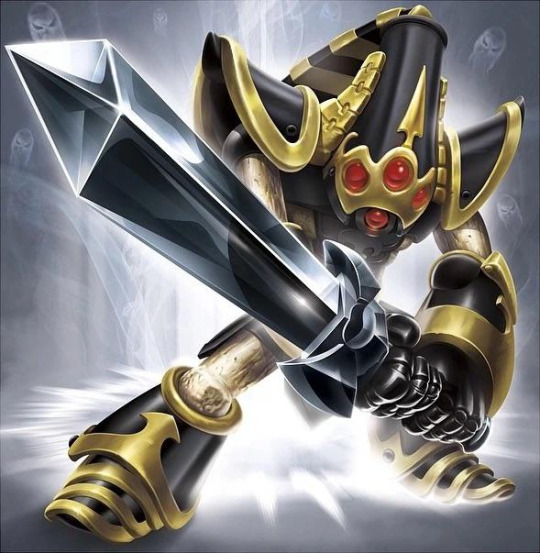

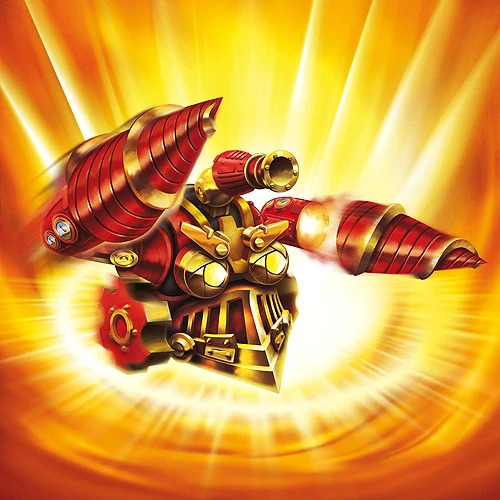
that first guy, krypt king, is all the way from game 4. so yeah the arkeyans are always subtly there. love it love it.
skylanders swap force (game 3)- the dev studio switches from toys for bob to vicarious visions, and to reflect that, there ends up being an entirely new Locale and Supporting Cast. flynn takes a vacation to the Cloudbreak Islands and meets some new other furries. these islands have these four Elementals who can do a magic eruption thing at a volcano. very powerful-old-magic of them. the swap force are skylanders who can swap tops and bottoms (the NFC tech on these were actually quite impressive) and kaos' plan ties into the gimmick because this magic volcano blast that banished the swap force way back when is happening again and he wants to use it to Turn Everything Evil with evil crystals. lovely
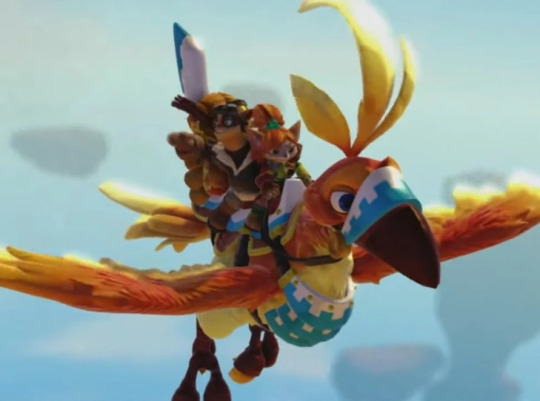
this dude is straight up a chocobo
skylanders trap team (game 4)- NEW GAME NEW GIMMICK. basically back in the day there were these Really Big Bad Villains called the Doom Raiders who get locked in prison with this nigh-unbreakable material called Traptanium. but kaos is an idiot who breaks them out because he knows no peace. the skylanders this time are called Trap Masters because they all have traptanium weapons (crystal weapons that kinda rocks) and another gimmick is that they sold these little plastic traps in stores and had a new slot in the portal where you could capture villains and play with them and theyd commentate on how you did. toys for bob is also back so they went back to the original supporting cast but they did add some new faces

there the doom raiders are ^ thats kaos in the middle btw. neglected to show you him but there he is. i think their designs are pretty cool. i like them :] this is the game that got me into skylanders but my little brother had been collecting them since spyro's adventure
skylanders superchargers (game 5)- so uh. this game's gimmick is Cars?

yeah. but also for some unexplainable reason, the plot this time is about THE END OF THE WORLD. the literal embodiment of darkness (...creatively just called The Darkness yeah i know.) has Reawakened and is basically using kaos as a pawn to destroy skylands to harvest its Surplus of Magic so he can use it as fuel to CONQUER other worlds. greater-good-of-bad type of thing. but kaos is REALLY hung up on that fact. because he really wants to RULE the world, not destroy it. for some reason. almost like he was an unloved child who finds solace in evil and was always seeking that twisted sort of validation and belonging. who knows. who knows. not me. maybe im looking too deep into this. he fires the only person whos ever stuck by him but when the world is Almost destroyed he realizes his mistakes and turns on the darkness and helps defeat it basically. and that means all his dark powers are gone but he says he'll work as the skylanders' Evil Consultant. basically antihero-redeemed. i kinda love that. and i realize how similar this sounds to a plot of a certain movie to Those Who Know. which may explain why i love this game.
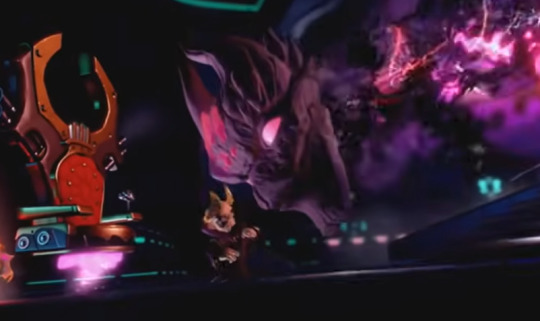
^these divas
i realize how biased this summary is around my favourite character and im sorry. the good guys are off trying to stop the end of the world its very fun.
skylanders imaginators (game 6)- WHY IS THIS SERIES STILL GOING THAT WAS A PERFECT ENDING. anyways the skylanders brand has for a while now been selling us junk that Arent skylanders figures. in trap team there were the traps in superchargers there were cars. and now. These
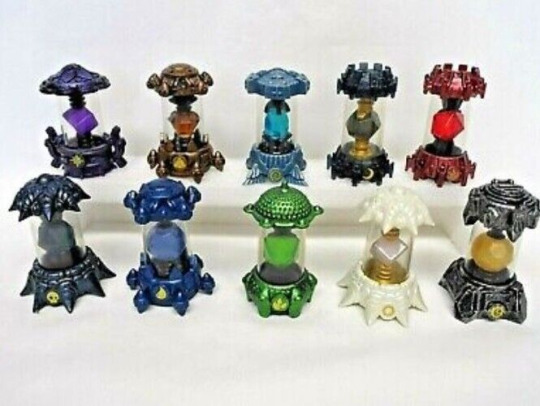
now YOU can create your OWN SKYLANDER! WOWWWWWW!! idk im over it. imaginators you are nothing to me. they did also have a line of regular figures to pick up called Senseis. those were cool. kaos finally got a proper figure. that was cool. but the plot has kaos going back to his Old Ways and using the magic you use to create your own skylanders to create his own evil doomlanders. and by the end he goes super saiyan. and he becomes tiny and they lock him in a jar. and that's how the series ends now. thanks imaginators.
they also have a core lineup of original skylanders (like the aforementioned stealth elf! and spyro and eruptor and shit) who would tag along with you on levels to get Synergy with the brand-new netflix series Skylanders Academy. yeah sure who even cares anymore. (IM SORRY I DONT LIKE IMAGINATORS. I AM NOT IMMUNE TO MY OWN PROPAGANDA)
look at this though. these are all the elements skylanders can be.

thus ends my rant
17 notes
·
View notes
Text
Why I’m angry: shock value is not tragedy
Tragedy is an ancient form of storytelling, and I was personally hoping for a real tragic end to Killing Eve. Specifically, I was looking forward to a good cry after some variation on a Romeo and Juliet ending. I say this to emphasize that I have no problem with Eve or Villanelle dying if it makes sense for the story and leaves me with a feeling of catharsis. But this ending was mere shock value, with none of the elements you see in tragic storytelling.
In a real tragedy, the hero’s downfall is caused by their own tragic flaws and events they set into motion. What flaw of Villanelle’s led to her death? Wanting freedom from the 12 who had stolen much of her life? Wanting to change and become something new? Loving Eve? Are we to believe the writers see queer love as a tragic flaw?
I and many others are angry because Villanelle dies for what seems to be no coherent reason at all. It’s not glorious or operatic. It’s not romantic. It’s not a noble sacrifice. It’s not redemptive. It’s arbitrary and abrupt, with no greater meaning for our heroines. This ending is just bullets cutting them down at the moment of triumph out of a sadistic cruelty toward the audience.
Carolyn has no coherent motive to have Villanelle killed, at least none that is shared with the audience. We might assume Konstantin’s note says Villanelle killed Kenny, but the audience and Carolyn know from Season 3 that Kenny was killed by Konstantin. Eve even calls Carolyn out on knowing who killed Kenny in the finale when they meet at the pub. There was CCTV of Konstantin in the building just before Kenny’s death, and Konstantin confessed he was there but it was an accident that Kenny died. Carolyn spared Konstantin at the last moment because she loved him, and that’s all there is to it.
Furthermore, even if Villanelle had killed Kenny, why would Konstantin implicate her in the murder? Konstantin loved Villanelle like a daughter and would not have wanted to bring Carolyn’s vengeance down on her. Making her the killer would undermine V’s whole arc in Season 3 about not wanting to kill anymore. Nothing in her reactions and body language in the Season 3 finale scene where Konstantin faces execution suggest she played a part. For these and other reasons, it doesn’t work as a retcon to make Villanelle the killer. Villanelle did not kill Kenny.
So even though it might seem like the information in the note should be a catalyst for what Carolyn does, the contents are not revealed to the audience and the thing we would most easily assume (about V killing Kenny) doesn’t make sense. The note then just serves as a MacGuffin to bring Pam to Carolyn so she has somebody to monologue to in the finale.
The only plausible motive we’re left with is the fact she wants to get back in the good graces of MI6. She tells Pam she is homesick for MI6, but that, “you don’t go back to MI6 emptyhanded.” WTF? Why? In the words of Eve, For what?
Carolyn is a sloppy mess of a character with no coherent motives throughout the entire series. From what we know, these are at least some of her past flip-flops:
(1) Young Carolyn is British intelligence, infiltrating the 12.
(2) Sometime later she defects to Russia. We know this because we hear from Vlad in S4 about how angry his colleagues are over her betraying the Russians the last time they worked together. That’s why they leave rats in her flat: a rat for a rat.
So she (3) must've returned to the MI6 fold. Maybe she was with Konstantin during this period (2-3)? Surely this would be explored in the spin-off (but fuck you SWG, I’m not watching!). So anyway she went back to MI6 and that's where she is when we meet her in Season 1.
(4) During S4 she's back with the Russians, in that terrible flat containing the rat smell. Why? It never seems to make much difference to anything that happens except to setup that 30 second chat with Hugo in the finale about his girlfriend being a spy.
(5) In the finale she's fucking over Villanelle to get back in with MI6 for the third time.
Carolyn clearly gives no fucks about national allegiances. So why is she going to kill Villanelle, a person who she was BFFing around Havana with earlier this season, just to get back into the good graces of MI6? A group she’s already defected from at least twice?
There is no plausible story explanation for what happens, so it’s not tragedy. We cannot feel catharsis because there’s no way to connect these events to the flaws and actions of our heroines.
Villanelle is just dropped dead by some bullets from the sky for no reason whatsoever. She had no agency in what happened to her. That’s shock value, not tragedy, and I’m so tired of sadistic self-aggrandizing writers thinking their work merits the “tragedy” label just because it causes the audience pain.
#killing eve#villaneve#tragedy#wlw#fuck you laura neal#and also a big middle finger to swg#byg#bury your gays#killing eve spoilers
230 notes
·
View notes
Text
Caesar Route Chapter 1 (12-16)
Last time on the Caesar Route, Caesar gets turned into a pig by accident and goes to see an illegal potions dealer to turn back into a human instead of just having a designated kisser or smth. Also there’s a cat who might be Hugo and also the world is ending because of trumpet players.
I always knew it would be the trumpet players.
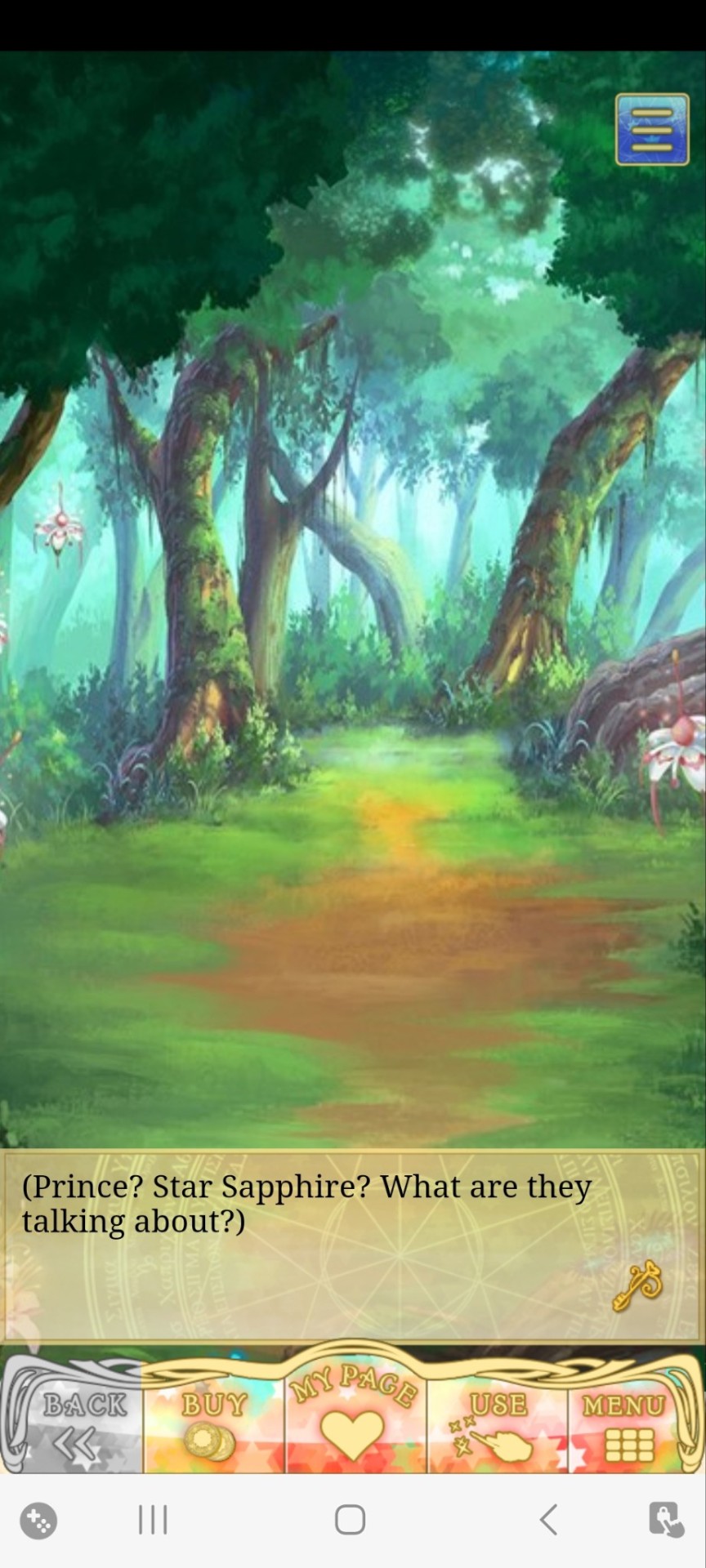
Ok it’s been a hot minute. I don’t remember ANY of this. I can’t even make a proper Star Platinum joke rn.
So Liz steps on a branch and Caesar’s drug dealer threatens to burn her, as you do, so she reveals herself and announces herself as Caesar’s friend. The drug dealer backs off and Liz asks where his visitor’s pass is, at which point he goes “hey hey hey no need to blow up on me” even though men have threatened Liz on this app with far worse. Including him literally ten lines ago.
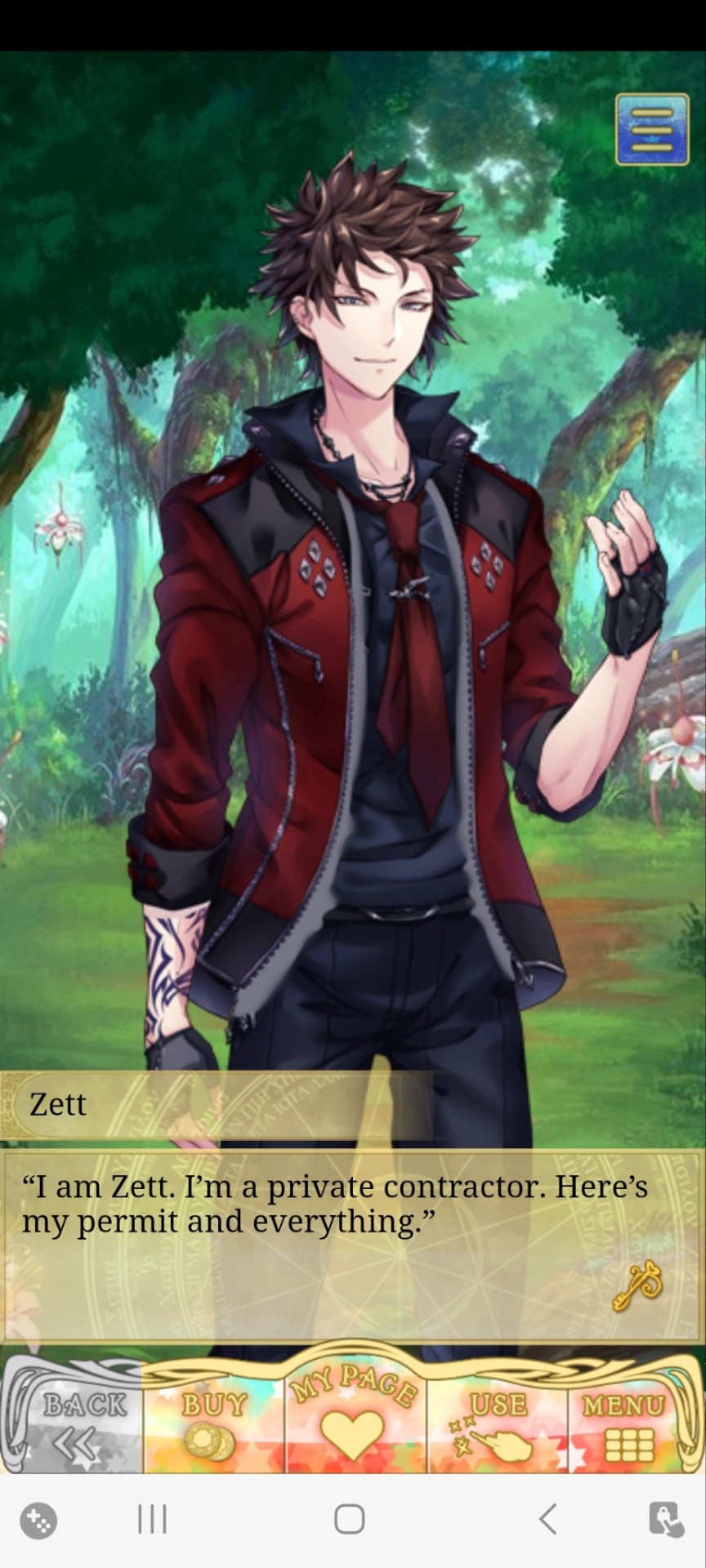
This. And apparently he has a real permit. Which Liz checks and signs off as legit. Zett leaves and Caesar explains that he’s “an old friend that he happened to run into.”
Mmhm.
Caesar also reveals that his childhood nickname was Prince for some reason and “Star Sapphire” is slang for a girlfriend...? Well, it’s not the worst euphemism I’ve heard. Or maybe he’s lying and Star Sapphire is slang for whatever bad guy macguffin we’re gonna have to deal with this time.
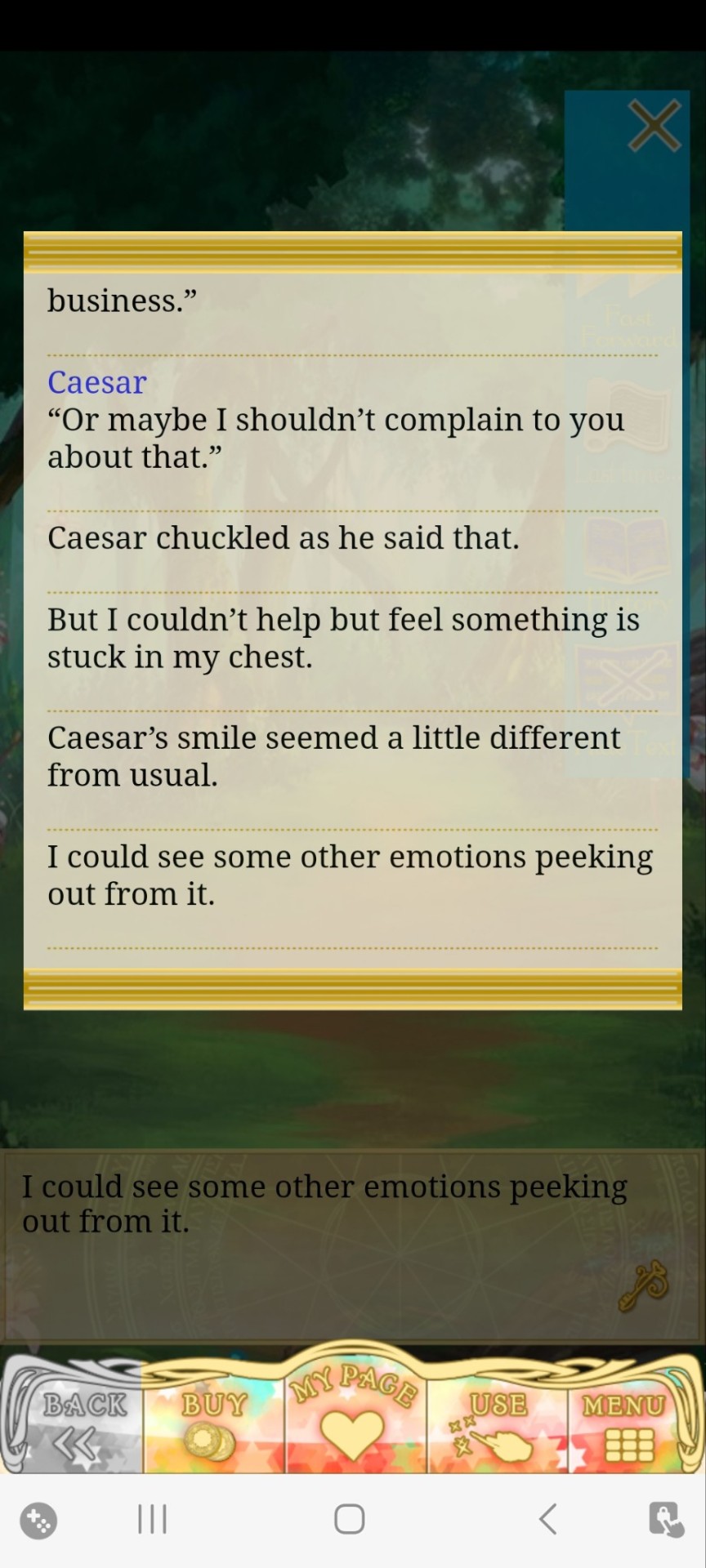
Liz picks up on some weird vibes from Caesar so I’m inclined to think I’m at least stumbling in the right direction. He talks about his childhood nickname some more, and you know what? I’m just gonna say it. This app has too many goddamn princes.
Liz and Caesar do some flirting that I’m struggling to follow.
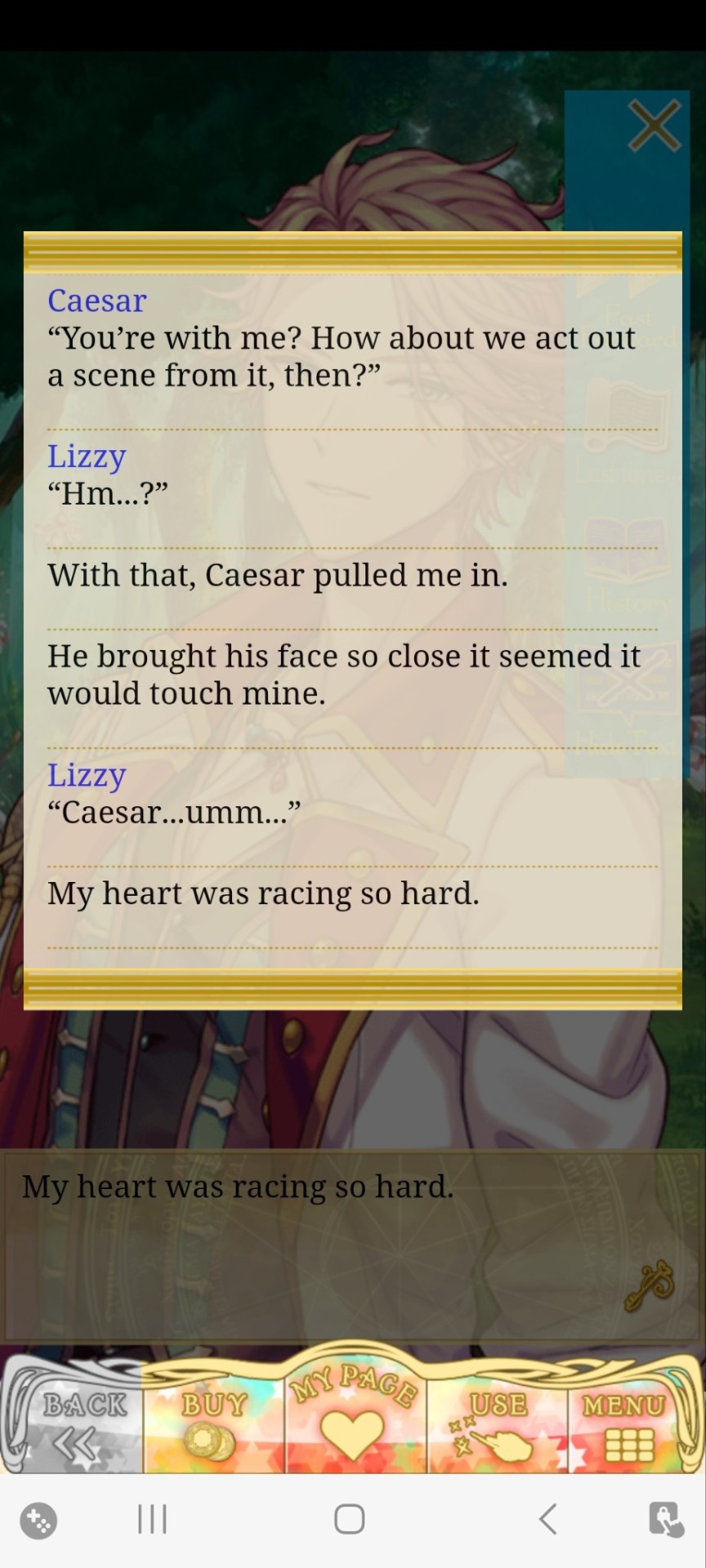
hey im pretty sure the JoJo’s Caesar did this too.
So Liz and Caesar finish their roleplay (...?) but Liz is still thinks the vibes are off.
The next day, Liz is going to teach a Night Class and decides to stop at the Night Cafe and encounters my least favorite person.
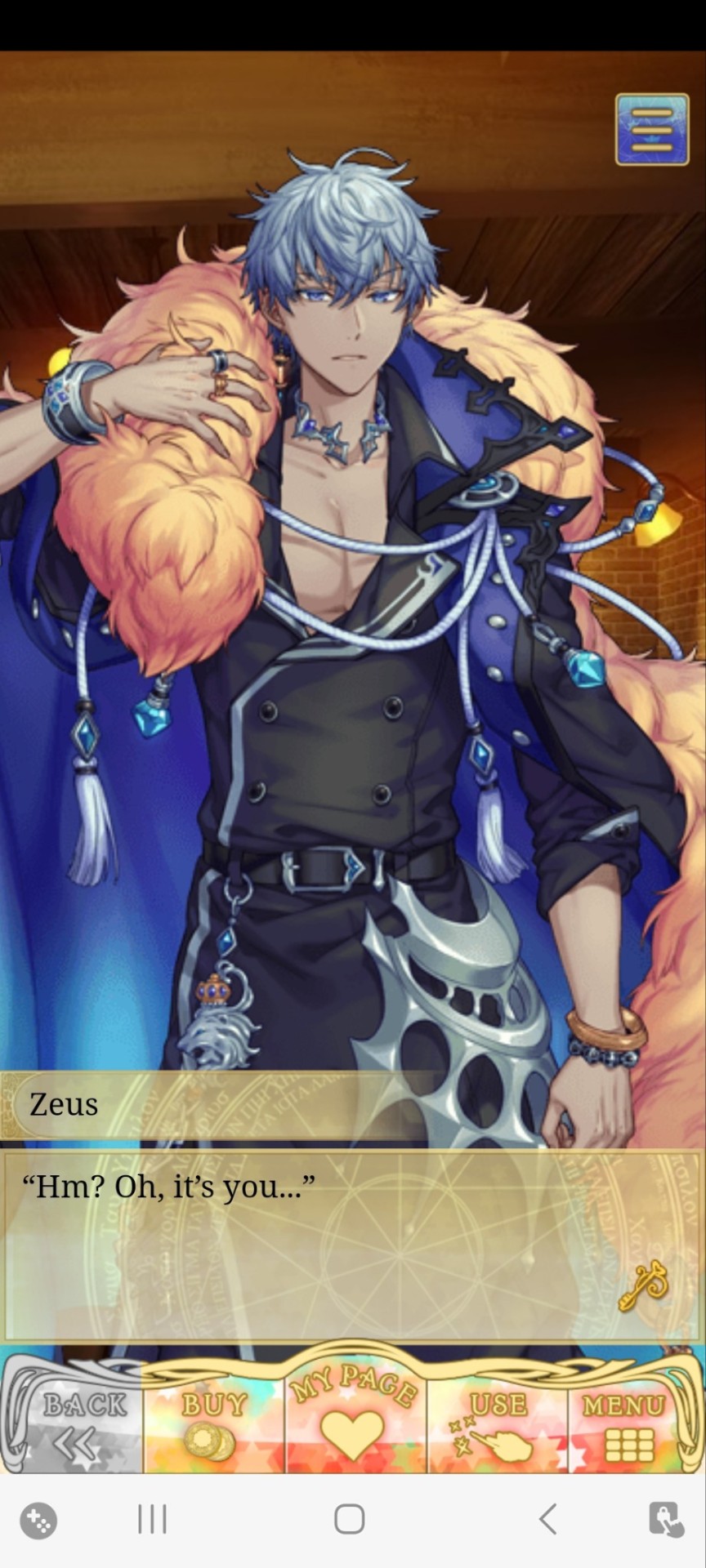
So Zeus and Hiro have an anime rival argument
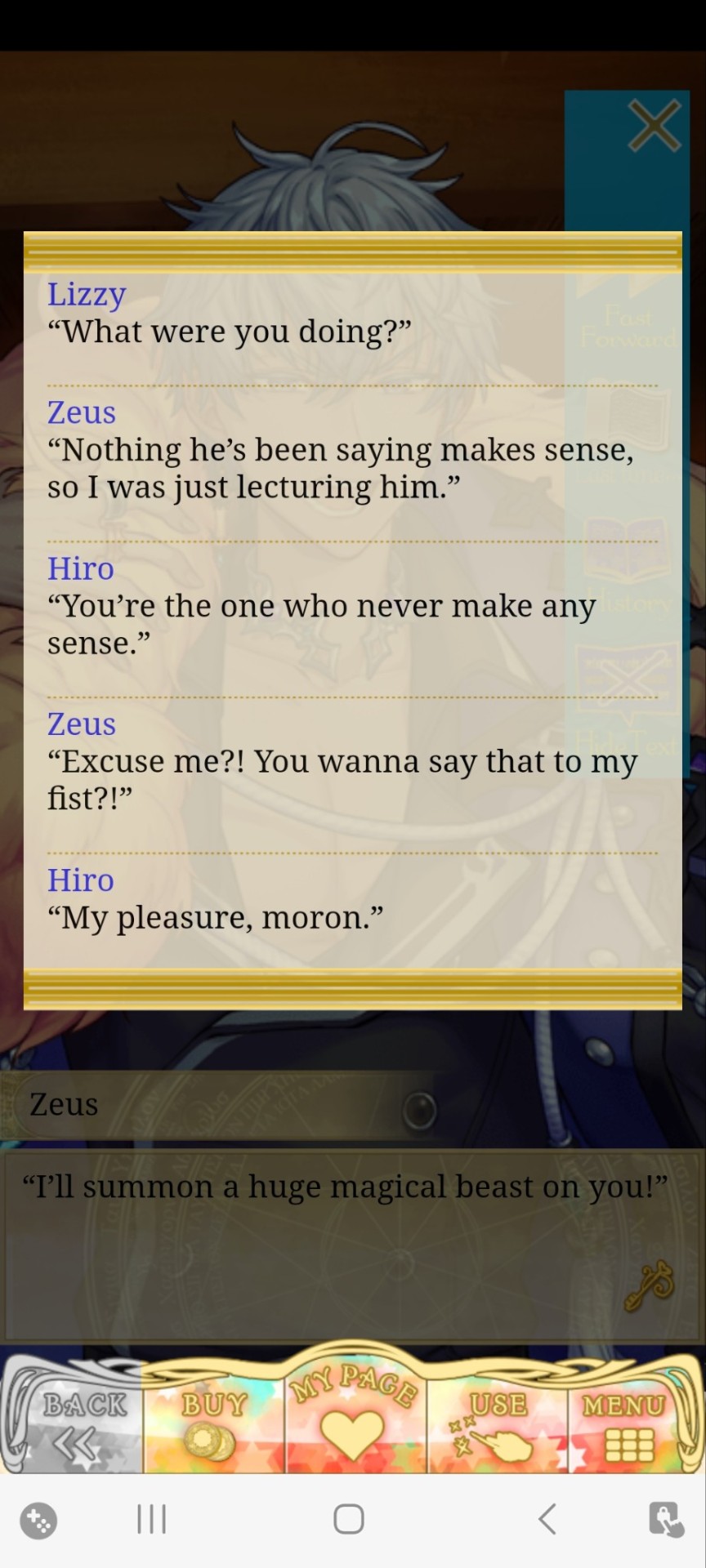
(What, you thought I was joking?)
Zeus apparently thinks he saw a wanted criminal on school grounds, but Hiro is convinced they wouldn’t be able to get past security. I’m skeptical since bad guys somehow keep finding their way PAST said security, but hey.
Zeus pulls out a newspaper to prove his point and Liz casually reveals she’s apparently helped them out as a reporter several times??? WHEN WAS THIS??? I bet this is referencing like a past event or some shit.
The first article Liz draws attention to is literal army propaganda (/hj) and the “magic soldier” plan is being put into action. I think this was offhandedly mentioned in a past route but I cannot remember the context. Zeus points to the wanted man section aaaaaaaand
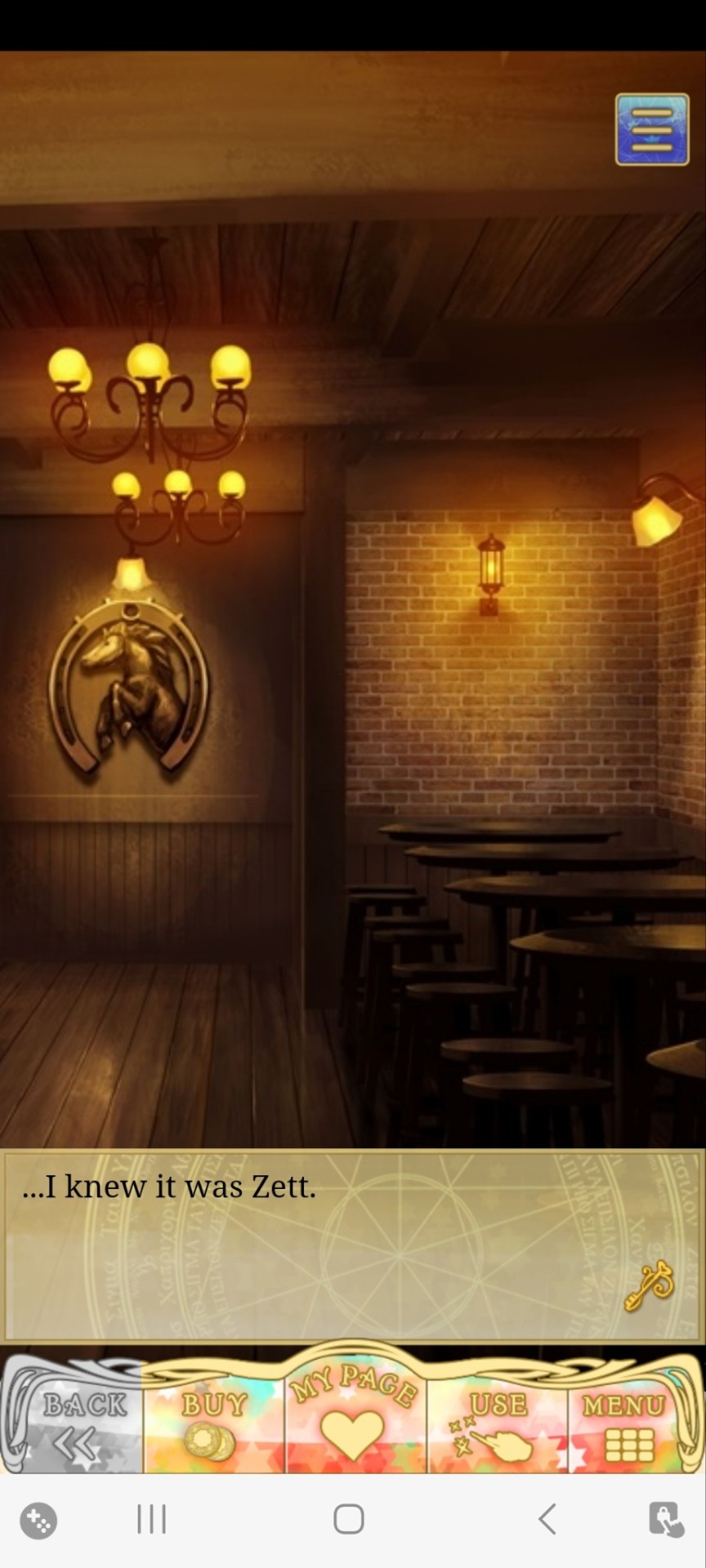
Zett is known as “King,” so now I’m thinking Caesar’s “childhood nickname” is actually a crime codename.
This is so funny but the JoJo’s Caesar also did crime-
Anyway Zett apparently does lots of crimes. Liz steals the newspaper from Zeus and runs away and I think it’s time for the trailer for next time. Alfonse and Elias present it and the next chapter is called “Hidden Identity”
(Queued for: January 10)
#wizardess heart#shall we date#solmare#caesar route#liz heart#caesar raphael#wh zett#zeus brundle#hiro tachibana
3 notes
·
View notes
Text
Brickclub 1.1.6 “How he protected his house”
I forgot to mention how much I like the last line of the preceding chapter:
Here we should give an exact idea of the Bishop of Digne’s house.
That and the title of this one are this faint intimation that somewhere, far off and still below the level of the horizon, the Plot is on its way.
I love the history baked into the Things in this chapter--that inconvenient layout where there are three rooms attached to each other and the middle one is a bedroom feels like people making do with the strange layout of a tiny hospital (which in turn was making do with the layout of some sort of meeting house).
And while Hugo isn’t stinting on the Simple and Holy Life of Privation aspects of the bishop’s life, I like how much in this sketch really isn’t that. These aren’t people from a poor background, they’re people from a wealthy and then a middle class background who are voluntarily poor. It shows in all the objects that are either very fine but decaying (there are SO many objects with the gilt or velvet almost rubbed off--surely Myriel’s arc in a nutshell), or else cheap imitations of fancy things (imitation lace on the altar, wood painted to look like marble on the mantle). Plus a few actually nice things (Mlle Baptistine’s nice chair, Myriel’s toiletries) that they still have with them. And, of course, the silverware and candlesticks.
(They’re HEEEEERE!!! Hello, beloved macguffins!)
I suspect this is all making an important point about how voluntary poverty isn’t the same as actual poverty. Even if you’re scrimping and saving the same amount day to day, having resources to fall back on and enough capital to set up a household comfortably before you start living thriftily is a VERY different life. And we’re going to see the difference later on.
This idea of nice things turned shabby and shabby things pretending to be fancy things--at some level the image reminds me of the two windows of the Gorbeau house. If I remember right: one is an improbably fancy window absolutely destroyed, the other has looked like the window of a hovel all along. There’s an image of two beggars of differing backgrounds accompanying the description.
Those Gorbeau windows feel like part of the whole between-impoverishment-and-respectability/liminal/transitional space that the Gorbeau house represents. But whereas there they’re meant to be scary and unsettling, this in-betweenness in the bishop’s house feels like a charming foible, and he’s gradually shedding it. I’m not exactly sure what makes the difference, or why these things should feel linked. There’s certainly a transition happening here, but it’s very much coded as positive.
On Mlle Baptistine’s efforts to save up 500 francs for a chair, of which she only ever gathered 42--
Hm.
To be honest, my entire feeling about this hinges on the question of how much she has a choice. Would her personal income (500 francs) let her live reasonably well away from her brother if she wanted? I still don’t love his day to day authority over her, but if she’s meaningfully choosing this life over other possible (not terrible) lives because it’s what she wants, and the slow saving up is an effort she’s enjoying within a system she’s fully bought into and is choosing, I get why the book’s tone about it is gentle and sweet and a little amused. I enjoy being thrifty for the sake of thrifty when it’s by choice rather than out of dire need, and it’s nice to have a small and inconsequential indulgence to anticipate and work towards. If this is that, than I support the tone with which it’s treated.
But if she’s falling back on Myriel’s rules because there isn’t some other life for her out there.... this is all instantly much less nice.
Hugo really wants me to be in the former camp; he’s written her as if she suits this life. I just don’t know that I trust him to have understood the consent issue I’m talking about.
I googled the two men on the bishop’s bedroom wall, but I couldn’t find anything but references to this text.
Also:
There is bravery for a priest as well as for a colonel of dragoons... only, ours should be peaceable.
There’s been a lot of talk of Myriel vs. Enjolras this readthrough, and this feels a little like Myriel addressing it directly.
23 notes
·
View notes
Text
Fic Writer Interview
Tagged by @everyonewasabird. Thanks for tagging me!
Name: ellen_fremedon on AO3
Fandoms: For the moment, though I’m still reading here and there in other fandoms, I’m very intensely monofannish about Les Miserables; I don’t think I’ve been this deeply ensconced in a single fandom since my Harry Potter days.
Where you post: AO3.
Most popular one-shot: I am confused at the distinction being drawn between one-shots and multichapter works; in my vocabulary, a one-shot is a self-contained story with no sequels, regardless of whether it’s chaptered.
In any case, my most popular non-chaptered one-shot, going by kudos, is “Twenty-Year Man,” a novella-length Ivan/Byerly (Vorkosigan Saga) fic featuring urban planning and electoral shenanigans.
Going by hits, my most popular fic is “A Place to Lie Down,” my Amis de l’ABC sex pollen fic, but that’s not actually a one-shot anymore, because I’m working on a sequel :D.
Most popular multi-chapter: I don’t post a lot of chaptered fic, but my favorite, and the most popular both by hits and kudos, is “The Scourge of Trion,” a novel-length Doctor Who story featuring the Fifth Doctor’s companion Turlough (and also Ten, Five, Eight, Sarah Jane, Martha, Jack, and some cameos and surprises). It’s ten years old and has been jossed on every front, but I’m still very proud of it.
Favourite story I’ve written so far: I’m terrible at picking favorites--and if I were to pick a top ten, the ones listed above would all be in it. But I think if I were to pick one story that best sums up me as a writer, it might be “Need to Know,” a crossover about Jack Harkness seducing Naraht, the Horta ensign from Diane Duane’s Star Trek novels, and featuring a lot of silicon-based gastronomy, temporal espionage, and curling.
Fic you were nervous to post: All of them? Who are you people out here posting fic without getting nervous, and how does that work?
How do you choose your titles: With extreme difficulty. I really envy people who can write good titles; mine are almost all very boring.
Do you outline: I do. My outline is usually a separate, combined outline and notes document where I write a precis of the story in a different tense or voice than the one the story is in. I chuck research findings and links and brainstorming into the relevant sections, and as I tick things off in the draft I usually shrink or grey out the font on those sections of the outline. I don’t usually start dividing the outline into scenes until I’m a good way into the actual draft and need to figure out which things I haven’t covered and still need to. But the “outline” itself is extremely vague and leaves a lot of room for discovery.
Complete: Everything. I have never posted an unfinished work and I can barely conceive of the chutzpah it would take to do so. Seriously how the fuck does that work--I’m a pretty linear writer, but even so, how do you know you’re not going to have an idea in chapter 20 that you have to go back and seed in chapter 2?
(That said, the novel-length Les Mis fic I have in progress is so long that, though I still can’t see myself posting chapter by chapter, I almost certainly will post the five parts as they’re complete. If they are ever complete.)
In progress: Right now, just the two Les Mis fics. The as-yet-untitled sequel to “A Place to Lie Down” is probably going to come in somewhere between 20K and 30K words--it’s at about 12K now. It’s gen, mostly, Combeferre POV and covering the week after the Trois Glorieuses.
And the novel-length one is...hoo boy. The draft of Part 1 is over 56K words, with two chapters still needing to be interpolated and the whole first half needing revisions that will probably add another 5-10K words. It is probably going to be around 75K by the time it’s done. (That is 75K before we get to meet Valjean! THREE TIMES AS LONG as it takes HUGO to introduce him in the Brick! It is a Valjean/Javert slow burn in the way that the Centralia fire is a slow burn.) And that’s Part 1 of 5. Part 3 is probably going to be shorter, but the whole thing, if I ever finish it, is probably going to run about 350K.
Coming soon/not yet started: My Yuletide fic, lol. I need to set everything else aside and work on that, like, now.
Prompts: I like them? I’ve written some good things to them? I love exchange fests--this Yuletide will be my seventeenth, which is terrifying. I have done it every year except the first one.
Upcoming work you’re most excited about: So. The one that I’m most convinced will be good is the "A Place to Lie Down” sequel, which I am definitely looking forward to finishing and posting. But the one I’m most excited about is the enormous novel--everyone I’ve talked to about it has called it my Time Agents AU, but it is actually canon-compliant! Everyone who is dead in canon still dies; it’s just that some of them are subsequently revived by the Time Agency, given training and a lot of therapy, and sent on deep-cover temporal ops. It has Hitchcock chase scenes, a black box macguffin, ontological casualty reports, art forgery, movie night in the secret subterranean base, cyborg Antonie Lavoisier, the Chevalier Saint-George, ivory-billed woodpeckers, an extended Canadian shack interlude, the mid-Lent crowning of the Queen of Laundresses, one slow burn romance, one intermittent dumpster fire romance, and a Latin pun about chickens in Part 5 that is honestly half of my motivation for getting to the ending. No-pressure tagging @white-throated-packrat, @petralemaitre, @dsudis, and @nonasuch (and anyone else who’d like to run with it).
6 notes
·
View notes
Text
The Path to Avengers: Endgame. Part 8 of 21--Thor: The Dark World
Observations and opinions. Feel free to disagree. I ain’t trying to convince you of nothing.
Destroying the bifrost in the first movie spun all the realms into chaos. Thor has been tidying up the chaos into manageable working order. While pining for his return, Jane Foster awakens an infinity stone which awakens The Dark Elves who want to go back to the literal dark age.
The Dark World has the lowest score of any Marvel Cinematic Universe movie on Rotten Tomatoes, which makes it a bad movie in the MCU. Aquaman has the second highest score for a DC Extended Universe movie, which makes it good. Would you like to guess how much better Aquaman’s score is compared to The Dark World’s? Go ahead. It’ll be fun for ya.
Fandral is not played by (Louisville born/New Albany native) Josh Dallas this time. He is played by Zachary Levi. That same Zachary Levi who is about to play Captain Marvel, not that same Captain Marvel that Brie Larson is playing, but that other Captain Marvel.
The Reality Stone is the MacGuffin of this movie, Loki’s scepter from The Avengers was the second Infinity Stone to make an appearance, making this the third to be seen. And for the first time, the Infinity Stones as a group are mentioned.
For years, critics of the MCU said that it had a “villain problem” because most of its villains aren’t memorable. The Dark Elves in The Dark World and Ronin in Guardians of the Galaxy are the best example of blandness. Even if their villainy storylines aren’t top-notch, actors with human faces—Tim Roth, Mickey Rourke, Sam Rockwell, Corey Stoll-- can at least make their performances charismatic. Actors with crazy alien heads have a harder time of it. You want to love to hate a villain. These bad guys with heavy makeup are just sorta there. Defenders say that Marvel's heroes are so interesting and likable that great villains aren’t needed. That’s true to some degree.
The main villain, Malekith, is in one of my favorite action scenes in the MCU. He gets into a tussle with Thor as portals are being created every which way. That fight takes place on a few different planets almost simultaneously, very inventive. CGI action fantasy is rarely put to better use than this. Although it’s a fun ride, I’m not clear on how the Selvig devices create additional portals. But then I’m not clear on how the internal combustion engine works either and they’ve taken me on plenty of fun rides.
Of all the actors who have not wanted to return or could not return to their roles--Terence Howard, Edward Norton, Hugo Weaving, Josh Dallas —Natalie Portman is the one I miss the most. There's a nice Tracey/Hepburn quality to her relationship with Thor. I say that having never seen a Tracey/Hepburn movie. They have what I imagine to be that classic Tracey/Hepburn chemistry.
Oh, and Aquaman has a 65% on Rotten Tomatoes, whereas The Dark World has a 67% score. Two out of six of the DCEU movies are fresh whereas 21 out of 21 MCU movie are.
According to Box Office Mojo, the DCEU movies average 318 million at the box office whereas the MCU movies average 343 million. I believe DC was ahead in that numbers game until 2018 when Black Panther and Infinity War became the two biggest comic book movies ever, boosting that average up. A pet peeve of mine is when people focus on box office results. Am I a stockholder? What difference does it make to me? But here I am partaking.
Bit o’ trivia: This is the first movie without the name “Stark” anywhere to be heard.
I want to see a Tracey/Hepburn movie now. Maybe on April 27th.
Stan Lee Cameo— Selvig’s shoeless pupil.
Mid Credits Scene— Sif and Volstagg give The Collector an Infinity Stone. Peter Quill questions the wisdom of this decision during Infinity War.
Post Credit’s Scene— See Jane, played by Natalie Portman, in a room alone. See Thor. See Jane recast. See Elsa Pataky kiss Thor. BTW--Elsa Pataky is Chris Hemsworth’s wife. This is the first time in the MCU where two actors played the same character in the same movie. Natalie Portman got Bela Lugosied and lived to tell the tale.
Returning Characters— Thor, Loki, Jane Foster, Odin, Sif, Fandral, Volstagg, Hogun, Heimdall, Frigga, Selvig, Darcy
#thor#chris hemsworth#the strongest avenger#loki#jane foster#the dark world#zachary levi#josh dallas#captain marvel#shazam
0 notes
Text
The Word Reclaimed, by Steve Rzasa
Like so many science-fiction and fantasy readers these days, roping back into modern works took some doing. Steve Rzasa’s writing was one of the things that helped steer me back into reading contemporary science-fiction and fantasy. His Hugo nominated Turncoat provided the proof of concept that these Rabid Puppy maniacs maybe had a point, and his work with Vox Day on Quantum Mortis proved that the world of sf/f wasn’t entirely lost. Three years and a lot of great books later, The Word Reclaimed provided me with yet another pleasant surprise.
With a cover and title like this, it’s a safe bet that what you are about to read will be heavy on the Christian themes. In a perfect world that’s all that you would need, but alas, many middling writers (and middling Christians) have used heavy Christian themes as a marketing gimmick to drive up sales for a book that would not sell well if it relied solely on its Churchian theology or poor writing. Such was my own trepidation on starting this book that it was only my previous exposure to Rzasa that allowed me to set aside my doubts and give it a shot.
I’m glad I set those doubts aside, because Rzasa delivers an action packed interstellar romp built on a Christian foundation, but one that offers more than comforting warm fuzzies for the faithful. In The World Reclaimed, the galaxy has moved beyond such petty concerns as man’s ultimate purpose in life and the pursuit of eternity to focus on important matters like money and power. At least, the powers behind the throne have done so, and they have built a large and not-so-secret police to ensure that the hokey religions of the past stay in the past.
Which they generally do outside of a few rebellious systems and secret cults, at least until a young man named Baden recovers an intact bible from the wreck of a ship destroyed by the aforementioned secret police. The bible becomes the classic MacGuffin that must be protected by Baden and the others on the ship in which he serves. Those others include a father who is close to Baden, but struggling to relate to him, and his rag-tag crew of smugglers and salvagers.
The action ratchets up a notch as a rebellious collection of systems throw off the secular humanist style religion that the imperial powers demand their citizens practice, and the galaxy drives headlong into a widespread war. The point of view shifts to another young man, a nobleman from a family of mech-pilots and naval officers tasked with serving the Empire in putting down a rebellion that they almost sympathize with.
It’s worth noting that the Christians in this narrative are not the only ones trying to regain what they’ve been denied by the secular authorities. As a far-flung future, surviving adherents of other religions make appearances, some of whom are also actively pursuing their own lost religious traditions. As was historically the case when murderous secular regimes tried to quash religious thought, the oppressed religious devotees make for strange but effective bedfellows who help each other out in solidarity against their common secular enemies. That’s a nice touch that helps add weight and authenticity to the future presented in The Word Reclaimed.
The story moves along at a good clip, and the Christian themes generally weave through the narrative as an excuse for the action. The outright mystical and divine intervention stays low-key even as it motivates the characters for much of the story, providing just the right amount of grounding in Christian thought without ever distracting the reader by tipping over into outright preachiness. In many ways, Rzasa’s deft touch reminds me of John C. Wright in the way he infuses his writing with discussion of religion in general and Christianity in particular with a naturalness that never feels forced or obtrusive. God exists. He works in mysterious ways. That’s the natural order of things.
After reading so much material where religion and its role in the life of humanity is ignored, if not outright rejected, it feels good to read a work where this fundamental aspects of life as it is lived by real people is given a natural place in the story. The Word Reclaimed never quite rises to the entertaining heights of the other Rzasa works that I’ve read, but it’s still and enjoyable space opera that’s well worth a look for those looking to inject a little more Christianity into their sf/f reading pile.
The Word Reclaimed, by Steve Rzasa published first on https://medium.com/@ReloadedPCGames
0 notes